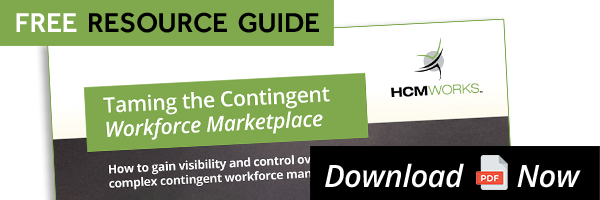For the past decade the gig economy - which is made up of contingent workers, such as freelancers, contractors, consultants and temporary workers - has been increasing rapidly. It’s now widely believed that as much as 30-40 per cent of the entire US workforce is working in contingent roles.
Traditionally, these contingent workers were perceived as lowly paid workers who filled, mostly, unskilled jobs. This is definitely not the case any longer, as highly-skilled workers are actively seeking out contingent work so they are free to work from where they want, at what time they want - all while being empowered to choose the company and project they feel most passionate about.
These contingent workers are a significant asset to your company, providing you the opportunity to create a flexibly, highly-skilled and agile workforce. However, most companies are mismanaging their contingent workforce. Many organizations are struggling to create a strategy that unifies the sourcing, management, engagement and optimization of their contingent workforce.
This, in turn, creates inefficient processes, wasted money, increased risk as well as many other negative effects on the health of your company.
While there are a variety of reasons that your organization could be mismanaging its contingent workforce, here at HCMWorks we’ve found that the divide between procurement and HR is often top of that list.
What is the traditional role of procurement?
Procurement is the process of obtaining quality goods and services that allow your business to operate in a profitable and ethical manner. Through issuing contracts, sending out invitations to bid and request for proposals, procurement is able to source certain commodities and services for your business.
Through the purchase of products or services from the best supplier and at the best possible price, procurement is able to boost profits for your organization.
What is the traditional role of HR?
HR is responsible for the hiring and administration of your company’s overall workforce. This department utilizes tools designed for people management to manage the role of recruiting people.
Not only that, but HR is also highly experienced in tracking the activities of workers. This ensures they are providing an end product that can drive your business forward and encourage growth.
So, who should source and manage contingent workers?
This is where the issue of hiring a contingent workforce comes in. Does this temporary resource fall under procurement which is experienced in dealing with vendors, or does the human element of this workforce make it the responsibility of the HR department?
In most organizations, the problem is that no singular department is accountable for the contingent workforce. The hiring of these temporary workers is often done in a haphazard manner, with no unified or consistent approach to how they should be handled - that’s why the large majority of companies have no visibility or control into how much they spend on the contingent workforce.
The management of contingent workers is so complex that no one department can take it on. In fact, both HR and procurement departments must work together if your company is to implement a successful contingent workforce management strategy.
Your organization’s procurement department can use its experience to create significant savings by managing vendor relationships, while your HR department can measure the actual quality of work provided by the contingent workers you source and manage their partnership with your company.
Want to learn more about how procurement departments and HR can work together? Read our blog titled ‘Why Procurement and HR Should Work Together’.
Why your organization should outsource
Just because your company’s HR and procurement teams are now working well together, that doesn’t mean your organization will suddenly have the expertise and resources to implement a successful contingent workforce management strategy.
To create a truly effective contingent workforce management program, it’s crucial that your business engages with an outsourced managed services provider (MSP).
An MSP that is experienced in the contingent workforce will implement a strategy that makes use of expert knowledge in areas such as compliance, talent acquisition, onboarding, payment, and the technology needed to implement these management processes such as a vendor management solution (VMS).
Want to learn more about the benefits an MSP can bring to your company’s contingent workforce management strategy? Get in touch with HCMWorks today. Our team of experts would be more than happy to answer any questions you have.



